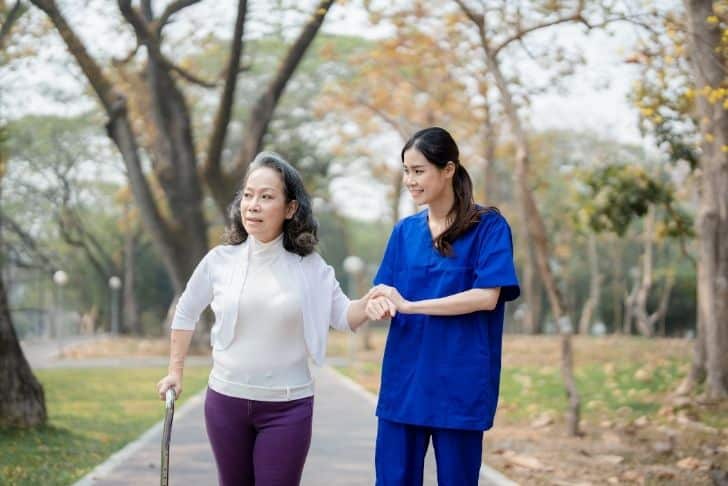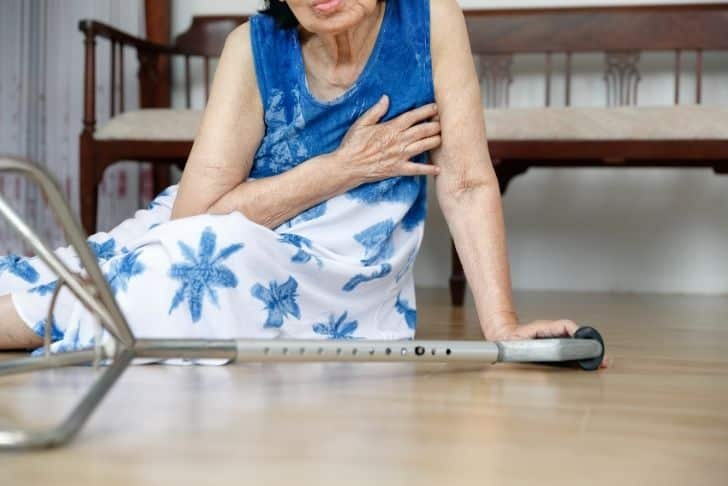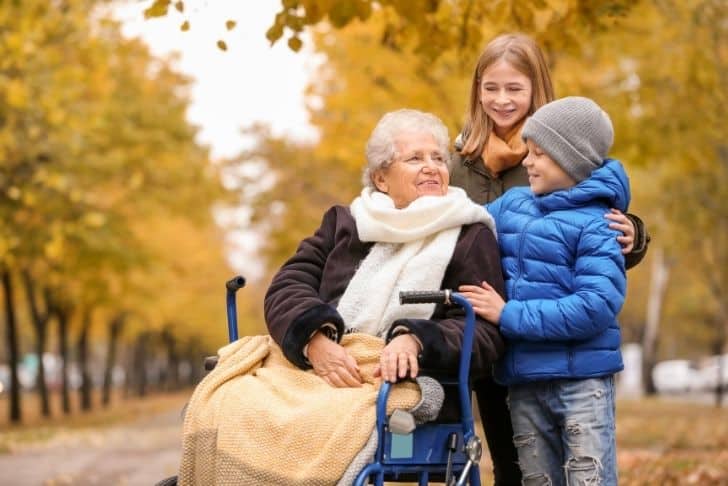As you age, your ability to remain steady and balanced may diminish, and with over a quarter of individuals aged over 65 experiencing falls each year, the aspect of home safety becomes paramount. Older adults are prone to falls due to various factors ranging from health conditions like diabetes, heart disease, or dementia to age-related muscle mass loss and certain medications. The fear of falling can also constrict your activity limits leading to avoidance of crucial exercises like walking or engaging in social events that actually assist in fall prevention. By adopting preventative measures like regular physical activity, secured homes, certain medicinal precautions against side effects, and maintaining a healthy weight range, you can avert falls and their related injuries. Consulting your doctor regularly and reporting episodes of any falls can safeguard you from future mishaps while staying prepared with the knowledge of how to handle a fall can save you from severe injuries and unnecessary hospital stays.
Understanding the Risk Factors for Falls
Wouldn’t it be great if you could predict your risk of falling? While it’s not an exact science, being mindful of certain risk factors can help you guard yourself against unnecessary accidents. Some of these risk factors can include a decline in eyesight, hearing, and reflexes. As we age, these essential senses tend to deteriorate which can increase the risk of falling. Paying close attention to any apparent changes can help identify potential problems.
Certain health conditions also pose a risk for falls. Conditions like diabetes, heart disease, and certain types of dementia can impair balance and coordination, making it more likely for falls to occur.
Your muscle mass also plays a key role in maintaining stability. Sarcopenia, an age-related loss of muscle mass can lead to fatigue, difficulty in movement, and a higher risk of falls. This loss can be gradual and often goes unnoticed until it leads to problems.
In some cases, even your medications can make you prone to falling. Certain sedatives, anti-depressants, and blood pressure medicines can cause dizziness or drowsiness, making you more likely to fall.
Last but not least, your choice of footwear and your living environment can significantly impact fall risks. Poorly fitting shoes and slippery or uneven surfaces can be quite hazardous.
Emotional Impact of Falling Risk
Living with the fear of falling can be quite disconcerting. It’s common for older adults to develop this fear, especially if they’ve experienced falls in the past. This fear can sometimes lead to avoiding activities that could actually help prevent falls, such as walking or participating in social events.
That’s why promoting a positive mindset is crucial. Rather than fixing on the fear, shift the focus on taking preventive measures and maintaining independence.
Ironically, avoiding activities due to the fear of falling can increase the likelihood of falls because these activities often involve exercises that could help improve balance and coordination.
Having a strong social and emotional support system can be very helpful in overcoming fear and anxiety. Sharing your concerns with a family member, friend, or healthcare provider can provide reassurance and necessary guidance.

Exercise and Physical Activity
One key strategy to prevent falls is staying physically active. Regular exercise is essential to maintain muscle strength, improve balance, and enhance coordination. Activities like walking, swimming, tai chi, and even light weight lifting can be beneficial.
On the other hand, certain types of exercises might not be suitable for everyone, especially for those with certain health conditions or mobility issues. Always consult your healthcare provider before starting a new exercise regimen.
Just as with anything, balance is key. Engaging in excessive or inappropriate exercise can backfire, leading to fatigue, injuries, or falls.
The Vital Role of Regular Health Check-ups
While regular health check-ups are essential at any age, they become increasingly important as we get older. Regular eye and hearing tests allow professionals to identify and rectify potential issues that may increase the risk of falls.
Prescribed medications can also increase fall risk due to their side effects. By having regular check-ups, your doctor can monitor these side effects and adjust the medication if needed.
Good quality sleep plays a vital role in fall prevention as well. Inadequate sleep or sleep disorders can cause dizziness and affect coordination, leading to more falls.
Furthermore, monitoring and controlling the intake of alcohol is significant. Even small amounts can impair balance and coordination, making falls more likely.

Home Safety Improvement
Most falls happen at home. So, taking time to pinpoint potential hazards and making necessary improvements can go a long way in preventing falls.
To make your home environment fall-proof, you can start by removing clutter, securing loose rugs, adding grab bars in the bathroom, and ensuring good lighting throughout the house.
Assistive devices like walkers or canes can provide support when walking, which can be particularly helpful on uneven surfaces.
Lastly, consider making safety a priority in your daily routines. Take your time when doing tasks, stand up slowly to avoid dizziness, use handrails on stairs, and don’t hesitate to ask for help when needed.
The Importance of Proper Footwear
Wearing proper footwear is a small change that can make a big difference. Shoes that fit well, provide good support, and have non-slip soles can significantly reduce the risk of falls.
Avoiding slippery surfaces is another effective preventative measure. Whether it’s a wet floor, freshly polished hardwood, or icy sidewalk, always tread carefully.
Keeping your hands free, especially when walking on uneven or slippery surfaces, allows you to balance more effectively and act quickly if you lose your balance.
Consider avoiding outings on days with bad weather. Snow, rain, and ice can make walking surfaces treacherous.

What to Do When a Fall Occurs
In case a fall does occur, it’s important to remain as calm as possible and not to rush to get up. First, assess yourself for any injuries. If you’re seriously injured, don’t attempt to get up and seek help immediately.
If you’re not seriously injured and feel confident enough to get up, do so slowly and carefully. Use sturdy furniture to support yourself and take your time.
Make sure to seek medical help, even if you believe you’re not injured, as some injuries may not be immediately apparent.
The Role of Nutrition in Fall Prevention
Good nutrition is a cornerstone for maintaining overall health and can significantly influence fall prevention as well. Adequate intake of calcium and Vitamin D is important to maintain bone health and to avoid fractures.
Limiting alcohol and avoiding smoking are key contributors to maintaining good balance and coordination.
Maintaining a healthy weight is also essential in fall prevention. Being underweight can increase the risk of osteoporosis and fractures, while being overweight can create extra stress on joints making falls more likely.
Understanding Osteoporosis and its Impact
Osteoporosis is a disease characterized by brittle and porous bones which makes individuals more prone to fractures. While it’s a common disease in older adults, many are unaware they have it until they experience a fracture.
Poor bone health, such as in osteoporosis, can make even minor falls more dangerous. This means that in addition to taking measures to prevent falls, you also need to strengthen your bones.
Regularly consult your doctor to check for signs of osteoporosis and discuss ways to maintain bone health, including regular exercise and adequate calcium intake.
Importance of Regular Consultations and Reporting of Falls
Lastly, maintain regular follow-ups with your doctor, even if you’re feeling fine. Regular health reviews can help detect potential problems and prevent future falls.
If a fall occurs, report it to your healthcare provider even if you’re not seriously injured. With their professional insight, they can analyze causes, suggest improvements to prevent future falls, or uncover any undiagnosed health issues which may be causing the falls.
Remember, falls are a common reason for emergency room visits and hospital stays amongst older adults. With fewer falls, we can hopefully reduce risks and increase our overall well-being as we age.
